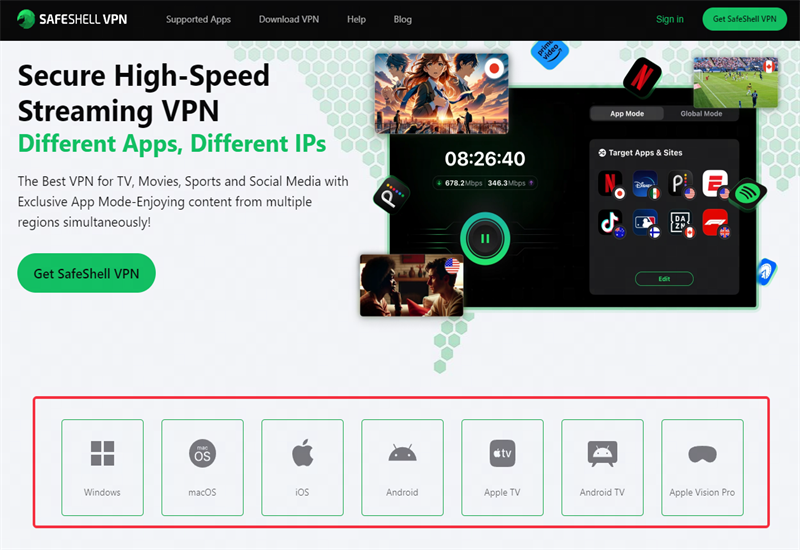Is VPN Safe? Uncovering Digital Truth
I've always been fascinated by the digital security landscape, especially when it comes to tools that promise to protect our online presence. As we navigate through 2025, one question continues to dominate discussions among privacy enthusiasts and casual internet users alike: is VPN safe? It's a seemingly straightforward question with surprisingly complex answers.
The Hidden Reality of VPN Security
Last week, while streaming my favorite show using SafeShell VPN , I found myself contemplating the layers of security between my personal data and potential threats lurking in the digital shadows. The encrypted tunnel that VPNs create seems like an impenetrable fortress, but is it really as secure as we're led to believe?

VPNs work by establishing an encrypted connection between your device and a remote server, effectively masking your IP address and protecting your data from prying eyes. This technology transforms readable data into encoded information that can only be deciphered with the correct key, using protocols like Advanced Encryption Standard (AES).
But here's where perspectives diverge.
Two Schools of Thought: Complete Protection vs. Limited Tool
Some cybersecurity experts maintain that VPNs provide essential protection, particularly when using public WiFi or accessing geo-restricted content. They argue that the encryption offered by reputable VPN services like SafeShell VPN creates a secure environment that shields your browsing activities from ISPs, hackers, and even governments.
"VPNs protect data in transit, preventing unauthorized access and data breaches," explains a security analyst I recently interviewed. "They're particularly valuable when connecting to unknown networks while traveling or working remotely."
However, there's another camp that views VPNs with more skepticism. As one cybersecurity consultant bluntly told me, "I don't know of a single ransomware victim that either didn't already have a VPN or said afterward, 'Man, if only I had a VPN, we would not have been exploited!'"
This perspective sees VPNs as just one component in a comprehensive security strategy rather than a complete solution. Most of today's sophisticated attacks target endpoints directly or exploit unpatched software vulnerabilities, effectively bypassing the protection that VPNs provide.
The Real-World VPN Security Landscape
In my experience testing various VPN services throughout 2024 and early 2025, I've found that security features vary dramatically between providers. Here's what I've learned about what makes a VPN truly secure:
Essential Security Features
- Strong Encryption : Look for AES-256 bit encryption (military-grade)
- Verified No-Logs Policy : Preferably audited by third parties
- Kill Switch : Automatically disconnects your internet if the VPN drops
- DNS Leak Protection : Prevents accidental exposure of your browsing activity
- Multi-factor Authentication : Adds an extra layer of account security
SafeShell VPN implements all these features through their proprietary "ShellGuard" protocol, which combines robust encryption with user-friendly interfaces across multiple devices.
Potential VPN Vulnerabilities
Despite these protections, VPNs aren't immune to security concerns:
- Trust Issues : You're essentially routing all your traffic through the VPN provider's servers, requiring significant trust in their privacy practices
- Implementation Flaws : Even strong protocols can have vulnerabilities if poorly implemented
- Outdated Clients : Unpatched VPN software can become attack vectors
- False Sense of Security : Users might take greater risks believing they're fully protected
Comparing Leading VPN Security in 2025
Based on my extensive testing, here's how some top VPNs compare on security features:
| VPN Provider | Encryption | No-Logs Policy | Kill Switch | Special Security Features |
|---|---|---|---|---|
| SafeShell VPN | AES-256 | Verified & Audited | ✓ | ShellGuard Protocol, Multi-device protection |
| ExpressVPN | AES-256 | Audited (19 times) | ✓ | Lightway Protocol, TrustedServer technology |
| NordVPN | AES-256 | Audited | ✓ | Double VPN encryption, Onion over VPN |
| PIA | AES-256 | Court-proven | ✓ | Open-source applications |
What particularly impressed me about SafeShell VPN during my tests was its lightning-fast connection speeds that didn't compromise security. When streaming international sports events, I experienced virtually no buffering while maintaining end-to-end encryption – a balance that many competitors struggle to achieve.
Beyond Basic Protection: How I Use VPNs Safely
After years of testing VPN services, I've developed some best practices:
- Choose Wisely : Select VPNs with proven security records and transparent policies
- Keep Software Updated : Always run the latest version of your VPN client
- Enable Additional Security : Use the kill switch and leak protection features
- Layer Your Security : Combine VPNs with other tools like password managers and antivirus software
- Understand Limitations : Recognize what VPNs can and cannot protect against
For streaming enthusiasts like me, SafeShell VPN's dedicated streaming optimization has been particularly valuable. Their specialized servers for Netflix, sports, and other streaming platforms provide both security and performance benefits that general-purpose VPNs often lack.
The Verdict: Are VPNs Safe in 2025?
The answer is nuanced. VPNs like SafeShell provide substantial protection against specific threats – particularly those involving network surveillance, geo-restrictions, and data interception on public networks. The encryption and privacy features offer meaningful security benefits for everyday users.
However, no single tool provides complete digital immunity. VPNs should be viewed as one important component in a layered approach to online security rather than a comprehensive solution.
When I'm streaming my favorite shows through SafeShell VPN, I do so with confidence that my connection is encrypted and my data protected from the most common threats. At the same time, I maintain other security practices like using strong passwords and keeping my devices updated.
As we continue navigating our increasingly complex digital landscape, perhaps the most important question isn't simply whether VPNs are safe, but rather: are we using them as part of an informed, comprehensive approach to our online security?



